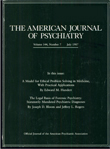Dr. Kendler and Colleagues Reply
TO THE EDITOR: We appreciate the thoughtful observations and comments by Drs. Trappler and Endicott. It is difficult to directly compare the conclusions that they reached with their clinically ascertained cohort with those taken from our epidemiologic samples. We would, however, concur that it is highly likely that the degree of stress-buffering provided by personal religious devotion is dependent upon a range of personal and historical characteristics. The work of Trappler and Endicott further demonstrates how much more we in the field of mental health have to learn about the role of religion in dealing with adversities.



